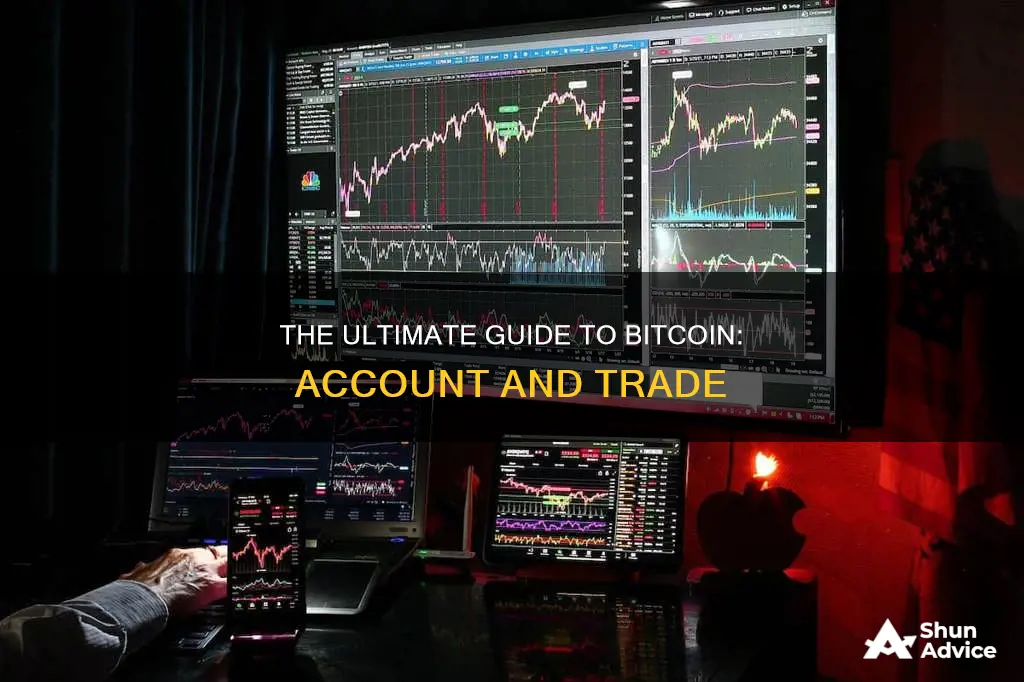
Bitcoin is a popular type of cryptocurrency that utilizes a large chain of interconnected computers to store and protect your digital assets. It is a highly volatile asset that's prone to large and fast swings in value, which presents an opportunity for large returns but also poses tremendous risk.
To invest in Bitcoin, you will need to open an account with a cryptocurrency exchange such as Coinbase, Kraken, Gemini, or Binance. You will also need a Bitcoin wallet, which can be a hot wallet or a cold wallet. A hot wallet is provided by your cryptocurrency exchange or a third-party software provider, while a cold wallet is a physical device that stores your Bitcoin offline.
Once you have chosen an exchange and set up your wallet, you can deposit funds into your account and place your first Bitcoin order. It is important to carefully assess your risk tolerance and investment strategy before investing in Bitcoin due to its high volatility.
| Characteristics | Values |
|---|---|
| Investment Options | Standalone Bitcoin, Greyscale’s Bitcoin Investment Trust, Amplify Transformational Data Sharing ETF, Bitwise 10 Private Index Fund, Bitcoin ETFs, Bitcoin ATMs, Traditional stockbrokers, Peer-to-peer money transfer apps, etc. |
| Risks | Volatile asset, high-risk, vulnerable to security breaches, pump-and-dump schemes, etc. |
| Steps to Invest | Join a Bitcoin Exchange, Get a Bitcoin Wallet, Connect Your Wallet to a Bank Account, Place Your Bitcoin Order, Manage Your Bitcoin Investments |
| Storage Options | Hot Wallets, Cold Wallets |
What You'll Learn

Choose a platform
Choosing a platform to trade Bitcoin can be a challenging task, especially for beginners. Here are some factors to consider when selecting a suitable platform:
Reputation and Security:
Look for well-established and reputable platforms that have been in operation for several years, such as Coinbase, Gemini, or Kraken. These platforms have built a solid reputation for security and trustworthiness. They employ robust security protocols to protect user funds and personal information.
Fees and Payment Methods:
Different platforms charge varying fees for trading Bitcoin, including transaction fees, deposit and withdrawal fees, and potential account fees. Compare the fee structures to find the most cost-effective option for your trading needs. Additionally, ensure that the platform supports your preferred payment method, whether it's a bank transfer, credit card, or debit card.
Cryptocurrency Selection:
Consider the range of cryptocurrencies offered by the platform. If you're solely interested in Bitcoin, most platforms will suffice. However, if you want to diversify your crypto investments and explore other coins, opt for platforms with a broader selection, like Crypto.com or Binance.
User Interface and Functionality:
The user interface and functionality of the platform are crucial, especially if you're a beginner. Look for platforms with an intuitive and user-friendly interface that makes it easy to navigate and execute trades. Some platforms, like Coinbase, are particularly renowned for their user-friendly experience.
Advanced Trading Features:
If you're an experienced trader, consider platforms that offer advanced trading features, such as margin trading, crypto derivatives, and customisable alerts. Platforms like Gemini and Kraken cater to advanced traders by providing professional-grade tools and a wide range of order types.
Customer Service:
As a beginner, you may require assistance at some point, so consider platforms with responsive and reliable customer support. Read reviews and feedback from other users to gauge the quality of their customer service.
Regulatory Compliance:
Ensure that the platform complies with regulatory requirements and follows laws that protect users. For example, some platforms require users to submit identifying documentation to prevent money laundering and comply with Know Your Customer (KYC) regulations.
Staking and Rewards Programs:
Some platforms, like Crypto.com and Coinbase, offer staking and rewards programs that allow you to earn interest on your crypto holdings. These programs can provide additional benefits, but be sure to review the terms and conditions carefully.
Remember to do your research, compare multiple platforms, and consider your specific needs as a trader. Always assess the risks carefully before investing in Bitcoin or any other cryptocurrency.
Why Bitcoin Belongs in Your Investment Portfolio
You may want to see also

Weigh storage options
When it comes to storing your Bitcoin, there are a few options to choose from. You can use a third-party custodian, such as a cryptocurrency exchange, or you can hold your Bitcoin in your own personal wallet. There is also a hybrid solution that balances these two options.
If you opt for a third-party custodian, you are entrusting them with your Bitcoin in a similar way to holding cash or other financial assets at a bank or brokerage. They will be responsible for holding and managing your funds according to your instructions. Many third-party custodians also offer additional functions such as crypto trading, staking, and exchanging Bitcoin for fiat currencies. This option is well-suited to individual investors who do not want the sole responsibility of safeguarding their digital assets.
If you prefer to have more control over your Bitcoin, you can choose to store it yourself using a self-custody wallet. This option is particularly popular among individuals who want full control over their cryptocurrency. There are three main types of self-custody crypto wallets: software wallets, hardware wallets, and paper wallets.
- Software wallets can be web-based, desktop, or mobile crypto wallets. While web-based wallets are convenient and don't require any software downloads, they are generally considered less secure due to their continuous connection to the internet. Desktop and mobile wallets, on the other hand, require software to be downloaded to your device and are generally more secure, especially when not connected to the internet.
- Hardware wallets are offline devices similar to USB drives. They are considered one of the most secure ways to store your Bitcoin, as they are not connected to the internet and are therefore not susceptible to remote hacking. However, they are less convenient than software wallets and can be more expensive.
- Paper wallets involve printing or writing your private keys on paper and storing them in a safe place. This method is technically "unhackable" but is prone to physical risks such as misplacement, theft, or damage to the paper.
When choosing a storage option, it's important to consider factors such as security, convenience, and cost. Additionally, if you plan to store a large amount of Bitcoin, you may want to consider consulting a security expert for specialized advice.
Strategic Bitcoin Investment: Choosing the Right Coins
You may want to see also

Decide how much to invest
Before you start investing in Bitcoin, it's important to understand that it is a very high-risk investment. Its value may rise or fall dramatically in a very short period, even within a few hours or days. Therefore, carefully determine your risk tolerance and review your investment strategy and financial goals before purchasing any Bitcoin.
- Discretionary Income: This refers to the money available after all core expenses have been covered, such as mortgage payments, food, travel, and debt. A secure strategy is to never invest more than your discretionary income.
- Dollar-Cost Averaging: This is a strategy employed by risk-averse investors, where they invest a small amount of money in Bitcoin at regular intervals (e.g., weekly or monthly). This approach ensures gradual investments and prevents over-exposure to a single cost price.
- Volatility: Bitcoin is known for its high volatility, with prices fluctuating significantly over time. Therefore, be prepared for potential short-term declines in the value of your investment.
- Risk Appetite: All investments carry inherent risks, but Bitcoin is significantly riskier than traditional assets like stocks, bonds, and real estate. Consider your risk tolerance and whether you are comfortable with the possibility of losing some or all of your investment.
- Diversification: Diversifying your investments across multiple assets, both digital and traditional, is a wise strategy. This can include investing in other cryptocurrencies (altcoins), stocks, property, or other assets.
- Expert Recommendations: While you should approach any outside advice with caution, experts generally recommend that investors limit their Bitcoin holdings to no more than 5%-10% of their overall portfolio.
Remember, there is no one-size-fits-all answer to how much you should invest in Bitcoin. The amount you invest should be based on your risk tolerance, financial situation, and investment goals. Start with a small amount that you are comfortable with and gradually increase your investments over time as you gain more knowledge and experience in the cryptocurrency market.
Bitcoin Investment: Your Guide to Getting Rich
You may want to see also

Manage investments
Once you've purchased your Bitcoin, you can:
- Use your coins to make online transactions
- Hold your coins for a long period in the hopes that they will appreciate in value
- Perform day trading with your coins—that is, buying and selling coins with other Bitcoin owners, which can be facilitated on a cryptocurrency exchange
Your cryptocurrency exchange will provide you with everything you need to buy and sell coins.
Manage Your Investments
After you've purchased Bitcoin, you'll need to store it in a hot wallet or a cold wallet. With a hot wallet, transactions are generally faster, while a cold wallet often incorporates extra security steps that help to keep your assets safe but also make transactions take longer.
Hot wallets are best for small amounts of cryptocurrency or cryptocurrency that is actively trading on an exchange and may be used like a checking account. A cold wallet is best for storing large amounts of cryptocurrency or cryptocurrency that you plan on holding for a long time.
When creating accounts for your digital wallets and currency exchange, use a strong password and two-factor authentication.
You can also use your Bitcoin to make purchases. Remember, when you make a transaction with a coin, there’s no actual money being pulled from your bank account. Money only leaves your bank account when you purchase the coin itself—not when you make purchases with a coin.
If you're investing, it's good to think about what kind of investor you want to be. Investors who day trade—a risky investment strategy that involves frequent buying and selling—try to buy Bitcoin low and sell it if and when its value moves higher.
But if you see a future for Bitcoin as a digital currency, perhaps your investment plan is to buy and hold for the long haul. Whatever your plan, know that owning Bitcoin may create a complex tax situation.
A Beginner's Guide: Investing in Bitcoin with Luno
You may want to see also

Understand the risks
Bitcoin is a very high-risk investment. It is a volatile asset, meaning its value may rise or fall dramatically over a short period—even within a few hours or days. As with all cryptocurrencies, Bitcoin has no intrinsic value. It is not backed by any physical asset, like gold or silver, and there is no central regulator to ensure the value remains stable. The value of Bitcoin is dependent on market demand. When there are more people buying Bitcoin, the value will increase, and when there are fewer people buying, the value will decrease.
The price of Bitcoin is constantly changing. For example, as of November 6, 2018, one bitcoin was worth $6,461.01. If you purchased a bitcoin on December 17, 2017, the price topped $20,000. Days later, on the 24th, buyers could not sell their investment for more than $14,626. With such an unpredictable market, there is no guarantee of a return on your investment.
As a technology-based currency, Bitcoin is vulnerable to cyberattacks and hacking. There is also a fair amount of fraud in the bitcoin market, with fake exchanges duping unsuspecting investors out of their money. While systems have been created to deal with these problems, security remains a big issue.
Additionally, there is little to no regulation of the bitcoin market. The government doesn't have a clear stance on cryptocurrency, and it is not taxed. A lack of taxation could lead to problems if bitcoin were to pose competition for government currency.
Another risk to consider is the lack of physical collateral. Unlike other forms of currency or investment, there is nothing tangible to back up Bitcoin. With gold, real estate, bonds, or mutual funds, you own something that can be exchanged. With Bitcoin, there is no physical collateral, and investors are more vulnerable to cyberthreats and online fraud.
Finally, consider the risk of block withholding. New bitcoins are created by solving mathematical equations called "blocks." However, a mining pool can use computational power to mine a block and hide it from honest miners, essentially allowing a select few to reap the benefits while others are left with nothing.
Tips for Mitigating Risk
- Understand your risk tolerance: Review your risk tolerance before investing in Bitcoin. If you don't feel comfortable with volatile assets or only have a small sum to invest, consider other options.
- Diversify your portfolio: Diversification is key to protecting yourself from investment losses. Invest primarily in low-risk assets like government bonds or index funds, then consider medium-risk investments like real estate or corporate stocks, and make high-risk investments like Bitcoin or penny stocks your smallest and least-prioritized holdings.
- Start small: If you're unsure, start with a small investment. You can invest as little as $10 or $25 to get a feel for how the process works.
- Choose a secure exchange and wallet: Opt for a reputable cryptocurrency exchange that insures losses in the event of a security breach or fraudulent transfers. Use a cold wallet, which is a hardware device that stores your coins offline, to protect your Bitcoin from cyberattacks.
The Ultimate Guide to Investing in Bitcoin
You may want to see also
Frequently asked questions
You can open an account with a cryptocurrency exchange such as Coinbase, Binance, or Kraken. You will need personal identification documents, bank account information, and a secure internet connection.
Bitcoin is a very high-risk and volatile asset. Its value may rise or fall dramatically in a very short period, and it is not backed by any physical asset or central regulator. There is also the risk of fraud and security breaches.
You can buy Bitcoin on a cryptocurrency exchange using your bank account, debit card, or credit card. You can also buy it through a payment processor like PayPal or a mainstream brokerage firm like Robinhood. Alternatively, you can buy it directly from another Bitcoin owner via a peer-to-peer exchange.
You can store your Bitcoin in a digital wallet, either a hot wallet or a cold wallet. A hot wallet is provided by your cryptocurrency exchange or a third-party software provider and is accessible via the internet or a software program. A cold wallet is an offline device, similar to a flash drive, that stores your Bitcoin. Cold wallets are generally considered more secure than hot wallets.
You can trade Bitcoin by speculating on its price movements without taking ownership of the cryptocurrency using derivatives such as Contracts for Difference (CFDs). This allows you to go long or short on Bitcoin and profit from rising or falling markets. However, trading derivatives can be risky due to the use of leverage, which can amplify your profits and losses.







